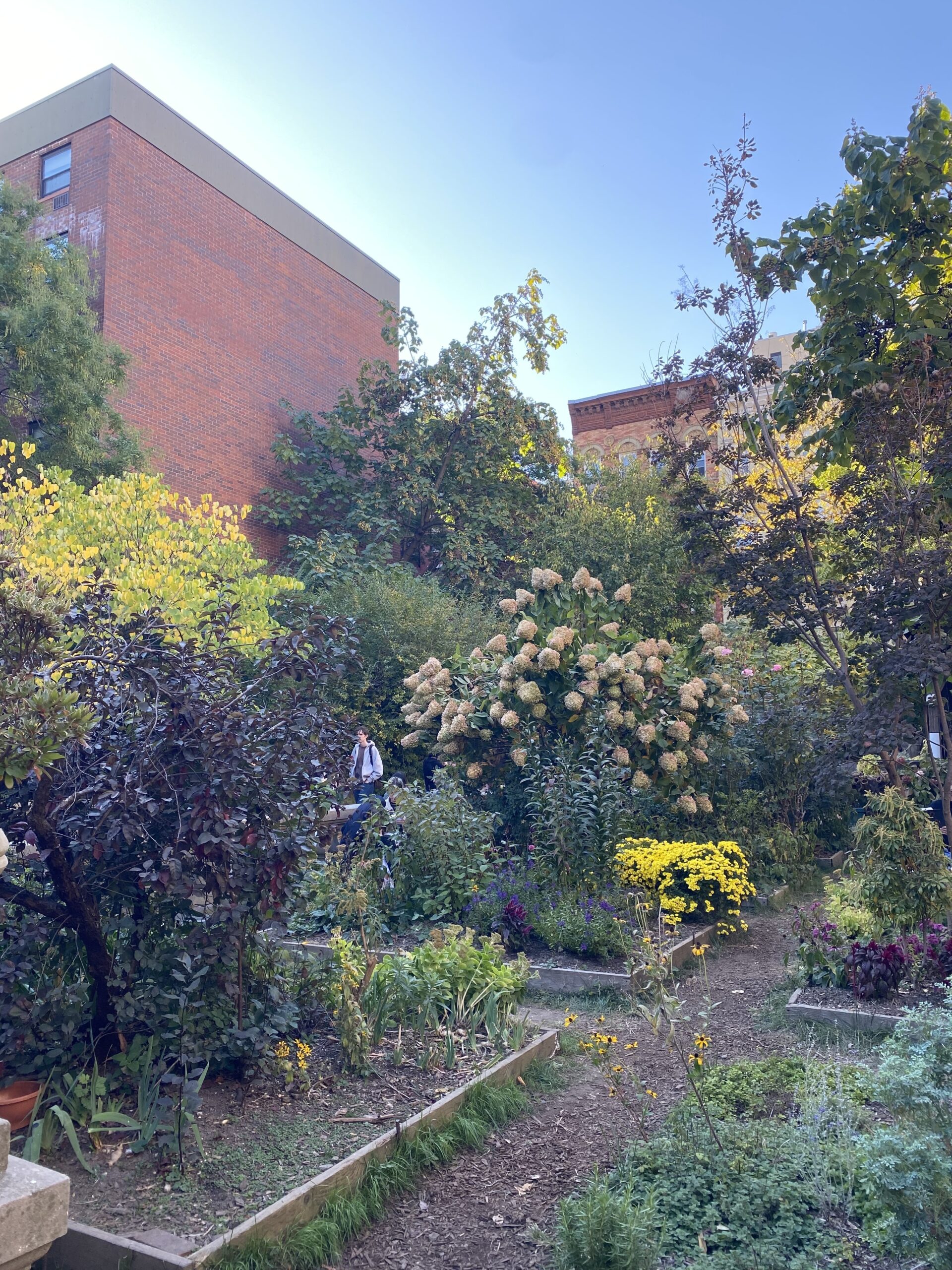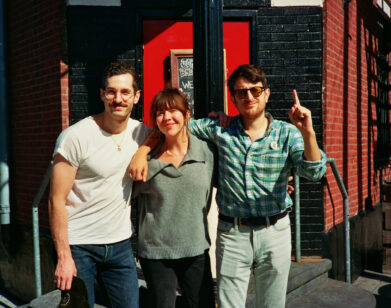PARKS
Meet Joseph Reiver, the Man Fighting to Save the Elizabeth Street Garden
FRIDAY 3:10 PM OCTOBER 18, 2024 LOWER EAST SIDE
Since its very inception, the Elizabeth Street Garden has been constantly under threat of closure. In 1991, when Joseph Reiver’s father, Allan Reiver, created the garden in an empty lot as an extension of his art gallery, it wasn’t long before the city started making plans to develop and thus destroy the lush, green oasis in the center of one of the city’s densest neighborhoods. Though the ESG’s board has presented the mayor’s office with several alternative sites in the district—all apt, Reiver contends, for the development of affordable housing, retail, and office space—the garden’s fate still hangs in the balance, as the temporary stay on their eviction ends on October 30th. Last week, we made our way to Elizabeth Street on a perfectly warm and sunny Friday afternoon to catch up with Reiver, who now acts as the garden’s steward and most vocal advocate. As fall foliage sprouted around us, we discussed the implications of the Eric Adams indictments and the garden’s ongoing battle with city government.
———
JULIETTE JEFFERS: So where are you at right now with the impending eviction?
JOSEPH REIVER: Well, we got a temporary stay, which is essentially a stay until we put in our papers for an actual stay, pending an appeal.
JEFFERS: Okay. How long does that go for, that temporary stay?
REIVER: Everything’s due by October 30th, so the temporary stay is in effect until then. We are going to put in our papers to the court. I imagine they are going to respond with theirs. They said they intend to fight it. We’ll have to see how the court responds. We also presented the city with a private site proposal that identifies private sites for housing and the city is also saying that that’s not serious, even though it’s warranted.
JEFFERS: Right. So there is another private site where they could build housing?
REIVER: Well, there’s a lot of other spaces. Since 2015, in coalition with the community board and different officials who are working to save the garden as well, we’ve been providing city-owned sites as alternatives for building affordable housing. One of them was 388 Hudson, which the city said they couldn’t build on for six years, from 2015 to 2021. They said they wouldn’t build on it, that it’s not an alternative. And then they actually started making plans to build on it recently after wasting six years. And then the other sites, they’ve also said similar dismissive things. Maybe they will start building on them too, who knows. This warbler’s been here for the whole day, actually.
JEFFERS: It’s really cute.
REIVER: Anyway, we shifted from trying to propose alternative city-owned sites for the housing, and we’re focusing now on privately-owned sites that the city would not have otherwise considered. Every time we found a new city-owned site, whether it be an empty lot or an underutilized building or something in transition, the city just said, “Thank you for bringing that to our attention. We’re aware of it. We’re going to add it to the list.” No matter how much validity there was to each city-owned site, they find a dismissive response for it. So we shifted our focus to privately-owned sites. We met with the mayor and we discussed reaching out to different owners. The mayor himself, and the deputy mayor, Maria Torres Springer, said, “Okay, bring us these sites and we’ll talk. If there’s something valid, we’ll do it. We’ll entertain it at least.” They gave us basically two days over the Labor Day weekend to do this. But we did it. And we connected with a few private site owners with an emphasis on two within the district. These sites could each provide at least 123 units of affordable housing in addition to other housing.
JEFFERS: Is that more than what this site would provide?
REIVER: This site would provide 123 units. So we set that as the minimum for any alternative site we might propose. But of course, the development would also include office space and retail, which the developers often don’t talk about. We also started working with city council member [Christopher] Marte’s office. He’s a big supporter of preserving the garden. He was working with us to go over how we can apply zoning variances. We started really coming up with these plans and we presented it to the mayor and they were interested. They met with us again. They had questions and concerns, all of which we’ve addressed. And unfortunately, they have not stopped the eviction because of this, even though we’ve asked for more time. Now, they’re saying that these sites are not serious because they’ll take time to go through public review, which is a terrible excuse because these buildings are sitting empty. They’re in the district. They don’t need to destroy this garden, and they could actually come up with multiple ways of addressing the issue.
JEFFERS: Well, that’s completely annoying. Has the Eric Adams scandal affected any of this?
REIVER: It’s a question we get asked a lot. I’ve been referring to it as a double-edged sword.
JEFFERS: Okay.
REIVER: It shows that there is corruption, or I guess I should say “alleged corruption,” within the administration regarding elected officials and developers. I don’t think anyone’s really surprised by it. I think a lot of New Yorkers know that that happens on a regular basis. It’s sad to see.
JEFFERS: We’re not surprised.
REIVER: Maria Torres Springer is now the first deputy mayor. She’s the one who wants to destroy the space the most. So in that way, she may be moving to expedite this while this administration is still in power, and that’s where it’s the double-edged sword.
JEFFERS: Basically, she’s worse?
REIVER: The mayor visited the garden the day before the news broke about the indictments. I spoke with him, and I actually asked him if he was willing to walk and see this private site around the corner with me. And he did. And we walked over and he seemed very interested in it at the time. I sent him the proposal directly. If you notice, when he’s asked about it at the recent press conference he just says, “We’re moving forward with the eviction.” He avoids addressing the private sites. He quotes his favorite vacancy rate quote and then he says something that doesn’t make sense. “We’re not kicking people out, we’re kicking people in.”
JEFFERS: Right.
REIVER: Which doesn’t even logically make sense.
JEFFERS: The phrasing is bizarre.
REIVER: I think he avoids our proposal because it’s a valid proposal.
JEFFERS: So I read that your father founded the garden, or contributed to how it looks today.
REIVER: I always say he built the foundation. At first, it was an outdoor extension of his gallery. He had an assistant, but sometimes it was really a one-man show. It was far too big for him to deal with. When it was an outdoor extension of his gallery, it was not as accessible as it is now. That grew over time.
JEFFERS: What year was this?
REIVER: It was built in 1991. He moved the gallery next door to the garden in 2005, and it became open to the public. It was just accessible through the gallery, not through the front gates the way it is now. Then in 2013, when people in the community started hearing wind that the city wanted to develop the space, they came to him and told him. We started working with them to see how we could make it more accessible and change the way the public interacted with it. We wanted to show the city its true potential. The city loves to say it was only opened up to the public because the city said they wanted to build housing on it. That’s not entirely true. It did get the fire under people to expand public accessibility, but it wasn’t closed to the public. It was accessible to the public through the gallery years before that. Once more people were able to get involved, it really started to expand from there.
JEFFERS: How did you get involved with the garden?
REIVER: I helped my father design a lot of this starting around 2009, after I graduated high school.
JEFFERS: Very cool.
REIVER: I would come here as a kid. I grew up in Brooklyn. And I would help with the design and I learned how to move different sculptures and deal with this whole space. I got involved more significantly when we found out the city wanted to develop it. I started doing the live music programs here and the movies, which are probably the first two big programs we did. And I’ve been involved ever since.
JEFFERS: I went to an Earth Day event here with Patti Smith. Obviously, the garden is full all the time. You’ve been facing the prospect of eviction since the beginning, yet every day, you can come here and it’s full of people. It’s a bizarre state of existence.
REIVER: Yeah. In a weird way, the whole effort to save it has become so intertwined with its existence. It shows people that something this valuable and this cherished can be lost. People are actively trying to destroy it, and that encourages community members and inspires them to get involved, contribute in their own way, and connect with the space. And that fast tracks this ever-expanding sense of community.
JEFFERS: Yeah, there’s a common enemy.
REIVER: A common goal of preservation. We’re not against housing; no one’s against housing.
JEFFERS: Of course not.
REIVER: We’re trying to solve an issue in a more elevated way. We’re focused on preserving the garden and building housing. That’s been the goal since the beginning of the whole effort. We have hundreds of programs. There’s been quite a lot of artists involved, from fine artists to filmmakers to musicians to poets. Art begets art. This artistic community is what really helps the garden to thrive. The garden itself is a work of art.
JEFFERS: I mean, there just aren’t other beautiful outdoor spaces in this neighborhood, in the middle of everything.
REIVER: It’s one of a kind.











